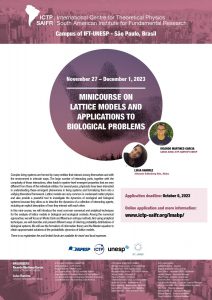 Complex living systems are formed by many entities that interact among themselves and with the environment in intricate ways. The large number of interacting parts, together with the complexity of those interactions, often leads to system-level emergent properties that are very different from those of the individual entities. For several years, physicists have been interested in understanding these emergent phenomena in living systems and formalizing them into a unifying theoretical framework. Lattice models are very common in condensed matter physics and also provide a powerful tool to investigate the dynamics of ecological and biological systems because they allow us to describe the dynamics of a collection of interacting agents, including an explicit description of how they interact with each other.
Complex living systems are formed by many entities that interact among themselves and with the environment in intricate ways. The large number of interacting parts, together with the complexity of those interactions, often leads to system-level emergent properties that are very different from those of the individual entities. For several years, physicists have been interested in understanding these emergent phenomena in living systems and formalizing them into a unifying theoretical framework. Lattice models are very common in condensed matter physics and also provide a powerful tool to investigate the dynamics of ecological and biological systems because they allow us to describe the dynamics of a collection of interacting agents, including an explicit description of how they interact with each other.
Por: ICTP-SAIFR/IFT-UNESP. Acesse aqui mais informações sobre o evento.
In this mini-course, we will introduce the most common numerical and analytical techniques for the analysis of lattice models in biological and ecological contexts. Among the numerical approaches, we will focus on Monte Carlo and Maximum entropy methods. And using analytical techniques, we will describe and present different ways of inferring probability distributions of biological systems. We will use the formalism of information theory and the Master equation to obtain approximated solutions of the probabilistic dynamics of lattice models. Saiba mais...

